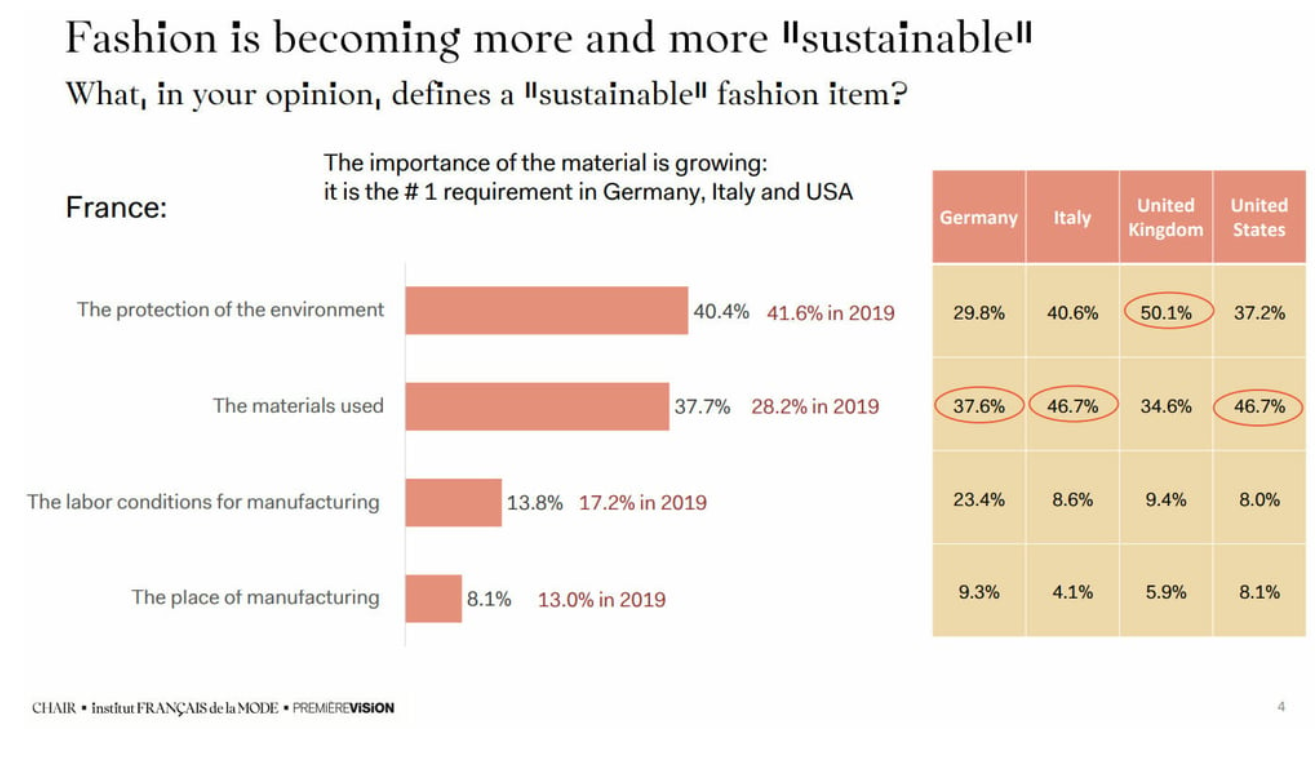
Presented on 4 July, the survey was conducted by the IFM and Première Vision on a sample of 5,000 respondents representing the French, British, German, Italian and American markets. The figures can be read in the light of a similar survey to be carried out in 2019.
The first finding is an improvement in fashion’s image when it comes to environmental commitments. 64.3% of French people (+6 points in three years) now believe that fashion respects environmental criteria as much as other sectors. This figure rises to 67.8% (+8 points) in Germany, 74.7% in Italy and 81.5% in the UK.
“Despite the crisis and the impact of inflation, the change in fashion’s image is clearly perceptible,” Gildas Minvielle, Director of the Economic Observatory at the Institut Français de la Mode (IFM), tells FashionNetwork. “And this despite the fact that the study carried out in 2019 showed that the sector was perceived as less active than others on environmental issues. These are good signals, even if the figures may disappoint on the spending side”.
The study shows that the panel is still only allocating a quarter of its clothing budget to responsible fashion. This should be seen in the light of the success of second-hand clothing, which is considered to be responsible, but whose prices are being driven down. The French now spend 148.6 euros on responsible fashion, compared with 136.5 euros previously. In Germany, this spending has risen from 148 to 212 euros, and from 171 to 230 dollars for Americans. These figures are rising even though fashion sales have not yet returned to pre-crisis levels.
The fact remains, however, that there is a discrepancy in behaviour by sector. While 44.9% of French people bought eco-responsible clothing last year, 68% of women bought organic food and 63% organic cosmetics. In the UK and Italy, 42% and 54.4% of respondents respectively bought responsible clothing.
Gone is the image of the potato sack once associated with responsible clothing. Across the entire panel, 9 out of 10 respondents felt that sustainable products were now ‘fashionable’. This was the case for only 8 out of 10 French people in 2019. In Germany, the proportion of positive opinions has even risen by 13 points.
What about the lack of consumer information? The 2019 study highlighted this pitfall: 50.4% of French people who did not buy sustainable fashion cited it as the main reason. Today, the figure is just 33%. In Germany and the United States, the proportion of consumers who consider themselves well informed has even doubled, to 36% and 57% respectively. With better information on products, but also on where to find them. The label is the main source of information, according to 60% to 70% of respondents, depending on the country, ahead of brand portals and their social networking accounts.
Deconsumerism and second-hand goods
The fourth finding is that purchasing behaviour and patterns are changing. What emerges is a desire to choose materials more carefully, in order to buy less but for longer. Some 37.7% of French people make materials their primary eco-responsibility criterion, as do 46.7% of Italians and Americans.
In the same vein, there is a growing desire to repair or have repaired clothes that they already own. Some 64.2% of French people will have done so by 2022, as will 82.4% of Italians and 74.5% of German women. This has not escaped the attention of some brands, which are now offering their own repair workshops.
Finally, the survey reveals the undeniable strength of the second-hand market. One in two women and one in three men in the panel bought second-hand clothes last year. Price remains the primary motivation in all five countries surveyed. However, it is worth noting that this price criterion is declining, in favour of the desire to consume more responsibly.
This is particularly true of French customers. Among respondents, the price factor is down to 68.6% (-6.2 points). At the same time, the eco-responsibility motive is gaining ground, reaching 48% (+5 points).
“Made in” and traceability
There is also the question of the link between proximity and sustainability in the minds of consumers. To be considered sustainable, 82.3% of the French, 79% of the Italians and 85% of the Americans believe that a garment must be produced in the country where it is made.
In Europe, this concept is becoming increasingly regional. A majority of the French (58.5%), Germans (69.2%), Italians (57.9%) and British (56.7%) consider European textile products to be responsible. “We are seeing the emergence of a more open vision of ‘made in’ than in the past”, points out Gildas.
Read full report – Fashion Network
